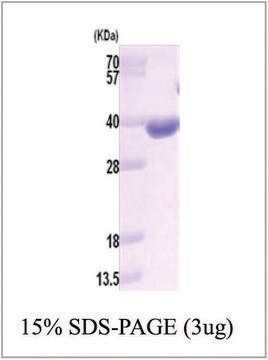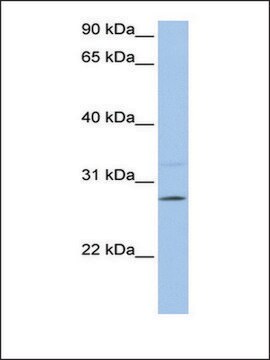SRP6371
Aldose Reductase human
recombinant, expressed in E. coli, ≥95% (SDS-PAGE)
Synonym(s):
ADR, AKR1B1, ALDR1, ALR2, AR, Aldo-keto reductase family1, member B1
Sign Into View Organizational & Contract Pricing
All Photos(1)
About This Item
UNSPSC Code:
12352204
NACRES:
NA.32
Recommended Products
biological source
human
recombinant
expressed in E. coli
Assay
≥95% (SDS-PAGE)
form
liquid
mol wt
35.8 kDa (316 aa, 1-316 aa)
packaging
pkg of 100 μg
concentration
1 mg/mL
UniProt accession no.
shipped in
dry ice
storage temp.
−70°C
Gene Information
human ... AKR1B1(231)
General description
Aldose reductase (AKR1B1) is a member of the aldo-keto reductase (AKR) superfamily. Recombinant aldose reductase (AKR1B) protein was expressed in Escherichia coli and purified by using conventional chromatography techniques. It is expressed in eye and kidney, but predominant in placenta. The AKR1B1 gene is mapped to human chromosome 7q33.
Biochem/physiol Actions
Aldose reductase (AKR1B1) catalyzes the NADPH-dependent reduction of a wide variety of carbonyl-containing compounds to their corresponding alcohols. This protein is implicated in the development of diabetic complications by catalyzing the reduction of glucose to sorbitol. AKR1B1 is also involved in cytokine-mediated generation of prostaglandin F2α (PGF2α) in preadipocytes. It participates in diabetes-associated mitochondrial disorder and damage via the activation of p53. AKR1B1 is associated with drug resistance mechanism in cancer-derived cell lines. It is also known to mediate cellular processes linked to carcinogenesis such as EMT (epithelial–mesenchymal transition), inflammation and angiogenesis. Aldose reductase mediates glucose metabolism in placenta and osmotic control in eye and kidney.
Physical form
1 mg/mL in 20 mM Tris-HCl buffer (pH 8.0) containing 1 mM DTT and 10% glycerol.
Signal Word
Warning
Hazard Statements
Precautionary Statements
Hazard Classifications
Eye Irrit. 2
Storage Class Code
11 - Combustible Solids
WGK
WGK 3
Flash Point(F)
Not applicable
Flash Point(C)
Not applicable
Certificates of Analysis (COA)
Search for Certificates of Analysis (COA) by entering the products Lot/Batch Number. Lot and Batch Numbers can be found on a product’s label following the words ‘Lot’ or ‘Batch’.
Already Own This Product?
Find documentation for the products that you have recently purchased in the Document Library.
Is rs759853 polymorphism in promoter of aldose reductase gene a risk factor for diabetic nephropathy? A meta-analysis.
Cui W, et al.
European Journal of Medical Research, 20, 14-14 (2015)
The human aldose reductase AKR1B1 qualifies as the primary prostaglandin F synthase in the endometrium.
Bresson E, et al.
The Journal of Clinical Endocrinology and Metabolism, 96, 210-219 (2011)
Prostaglandin (PG) F2 alpha synthesis in human subcutaneous and omental adipose tissue: modulation by inflammatory cytokines and role of the human aldose reductase AKR1B1.
Michaud A, et al.
PLoS ONE, 9, e90861-e90861 (2014)
Candidate locus analysis for PHACE syndrome.
Mitchell S, et al.
American Journal of Medical Genetics. Part A, 158(6), 1363-1367 (2012)
Aldose reductase-mediated phosphorylation of p53 leads to mitochondrial dysfunction and damage in diabetic platelets.
Tang WH, et al.
Circulation, 129, 1598-1609 (2014)
Our team of scientists has experience in all areas of research including Life Science, Material Science, Chemical Synthesis, Chromatography, Analytical and many others.
Contact Technical Service






